|
Welcome
| |
The first day of autumn has come and gone, and the crisp mornings and cool evenings of late October remind us that winter is just around the corner. It is time to take stock and gather stores, preparing for the next season.
Along with the change in seasons comes an increase in infectious disease, disproportionately affecting the most vulnerable and valued members of our families and communities-Elders and young children. In order to better understand how influenza and influenza-like illnesses impact Indigenous communities, the NCCAH has partnered with the five other National Collaborating Centres in a 2-year project focusing on influenza and the 2009 H1N1 pandemic. The first paper in the series focuses on epidemiology and gaps in knowledge about 2009 H1N1 influenza pandemic among First Nations, Inuit and Métis peoples in Canada. The second paper is a literature review focused on the prevalence and severity of influenza infection in Aboriginal populations in Canada. The third paper in this series draws lessons learned from 2009 H1N1 influenza pandemic for pandemic planning in Aboriginal communities. Additional document in this series are available at the NCCID web site. (See the full web story.)
As always, the NCCAH is committed to sharing our resources and maintaining a presence at events such as the Northern Health Research Days conference (November 7-9 in Prince George, BC) and the B.C. Aboriginal Child Care Society (BCACCS) annual conference (November 10-12 in Richmond, BC). Also in November (the 21st-22nd), we will have French language resources available at l'Institut national de santé publique du Québec's (INSPQ) annual conference, Journées Annuelles de Santé Publique (JASP). In September I participated in three events while in eastern Canada. First I provided the closing address for the 2016 forum and annual general meeting of the Canadian Academy of Health Sciences (CAHS) in Ottawa. The forum, Solutions to Inequities in Indigenous Health: What Works and Why? brought together an excellent program of Indigenous and non-Indigenous presenters and participants engaging in meaningful and important discussions about the health of Indigenous peoples in Canada. I next participated in the panel Truth and Reconciliation and Child Care at the CUPE Child Care Roundtable in Ottawa. At this event attendees, myself and co-panellists Anna Claire Ryan of the Inuit Tapiriit Kanatami (ITK) and Janice Ciavaglia of the Assembly of First Nations (AFN), explored several aspects of the CUPE's child care policy that could support both the work of the Truth and Reconciliation Commission (TRC) and the principles outlined in UN Declaration on the Rights of Indigenous Peoples (UNDRIP). Lastly in September I presented on the social determinants of Indigenous health at the Continuing Medical Education (CME) accredited Atlantic Canada Medical Officer of Health Conference.
I am also very pleased to announce my recent appointment by the Canadian Institutes of Health Research (CIHR) to the Institutes Advisory Board (IAB) on Health Innovation. The Health Innovation IAB is one of five advisory boards providing strategic advice on approaches and directions for each of CIHR's 13 research institutes. The inclusion of Indigenous appointees on each of the five IABs will ensure that Indigenous knowledge is taken into account across the CIHR system. (See the full web story.)
Another new and promising initiative the NCCAH is supporting is the Global Child Initiative, a project focused on developing indicators to help governments monitor and report on the rights of children. The NCCAH will play a key role in this project by establishing an advisory committee of Indigenous knowledge-holders, scholars, and decision-makers to ensure cultural safety and appropriateness in adapting the monitoring tools to the unique needs and circumstances of Indigenous children. This is a project I am passionate about, building on my past work on the rights of Indigenous children. (See the full web story.)
Finally, we would like to thank our over 3,100 followers on Twitter, helping us maintain a valuable online social media presence. Whether face-to-face at conferences or online in cyberspace, we value the new connections we make every day in the exciting and ever-changing landscape of #IndigenousHealth in Canada.
If you are interested in knowing about all of our publications, please see our Resources Booklet. Be sure to visit our website or subscribe to our mailing list to receive notifications of newly released NCCAH resources, upcoming webinars and our regular quarterly newsletters. Please enjoy and share our knowledge resources with your community and networks and join us on Twitter, Facebook, Google+, LinkedIn, Vimeo, YouTube, or SoundCloud to participate in updates as they happen!
Meegwetch
Margo Greenwood, Academic Leader
National Collaborating Centre for Aboriginal Health (NCCAH)
|
|
|
Attended Events
|
Upcoming Events
| |
Atlantic Summer Institute (ASI) 2016
Charlottetown, Prince Edward Island, August 16-18, 2016. Conference web site link
CIPHI's 82nd Annual Educational Conference (AEC) Edmonton, Alberta, September 26 - 28, 2016. Conference web site link
The 6th Global Forum on Health Promotion Charlottetown, Prince Edward Island, October 16 - 17, 2016. Conference web site link
Heart-Mind Conference Surrey, British Columbia, October 21 - 22, 2016. Conference web site link
Please visit the online NCCAH calendar of events, which highlights conferences, workshops, and other events of interest in the field of Aboriginal Health including regional, national and global listings. |
RCAP National Forum: Sharing the Land, Sharing a Future
Winnipeg, Manitoba, November 2 - 4, 2016. Conference web site link
Research Days Conference Prince George, British Columbia, November 7 - 9, 2016. Conference web site link
BCACCS 2016 Annual Provincial Training Conference Richmond, British Columbia, November 10 - 12, 2016. Conference web site link
Les 20es Journées annuelles de santé publique (JASP) Montreal, Quebec, November 21 - 22, 2016. Conference web site link
Send us an email to nccah@unbc.ca with "Calendar Submission" in the subject line if you have an event you would like added to our calendar. |
|
|
Online Resources
| |
In support of creating a health community focused on knowledge synthesis, transfer and exchange we have chosen a sampling of current online resources to share. Please note the links provided in the NCCAH newsletters are for general interest only and do not indicate an endorsement. The views expressed in the linked resources do not necessarily represent the views of the NCCAH or our funder the Public Health Agency of Canada.
Send us an email to nccah@unbc.ca with "Online Resource" in the subject line if you have an online resource you would like added to our next newsletter.
|
| |
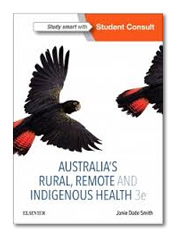
Australia's rural, remote and Indigenous health 3ed
|
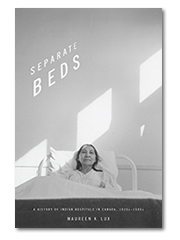
University of Toronto Press - Separate beds: A history of Indian hospitals in Canada, 1920s-1980s
|
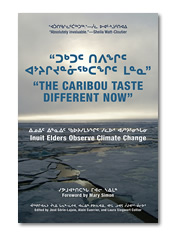
Nunavut Arctic College Media - "The Caribou Taste Different Now" Inuit Elders Observe Climate Change
| |
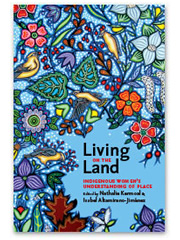
Athabasca University Press - Living on the Land: Indigenous Women's Understanding of Place
|
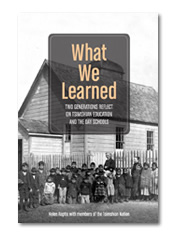
UBC Press - What We Learned: Two Generations Reflect on Tsimshian Education and the Day Schools
|
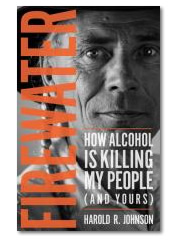
University of Regina Press - Firewater: How Alcohol Is Killing My People (and Yours)
| |
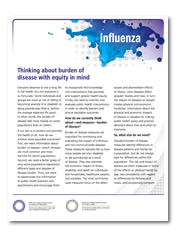
NCCID - Influenza: Thinking about burden of disease with equity in mind
|
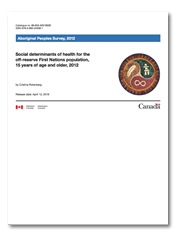
Statistics Canada - Social determinants of health for the off-reserve First Nations population, 15 years of age and older, 2012
|
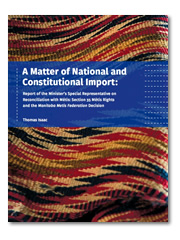
A Matter of National and Constitutional Import: Report of the Minister's Special Representative on Reconciliation with Métis: Section 35 Métis Rights and the Manitoba Metis Federation Decision
| |
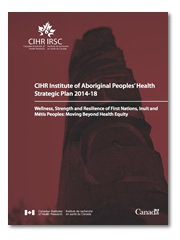
Canadian Institutes of Health Research (CIHR) - Institute of Aboriginal Peoples' Health Strategic Plan 2014-18
|
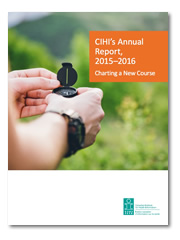
Canadian Institute for Health Information (CIHI) - Annual Report, 2015-2016: Charting a New Course
|
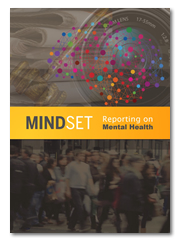
The Canadian Journalism Forum on Violence and Trauma - Mindset: Reporting on Mental Health
| |
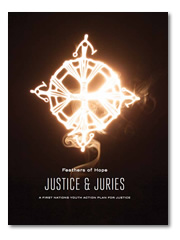
Feathers of Hope: Justice and Juries - A First Nations Youth Action Plan for Justice
|
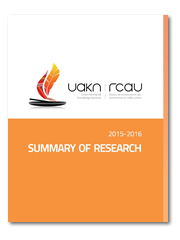
Urban Aboriginal Knowledge Network (UAKN) 2015-16 Summary of Research
|
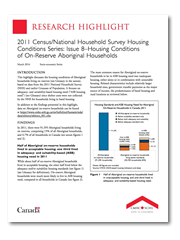
CMHC - 2011 Census/National Household Survey Housing Conditions Series: Issue 8-Housing Conditions of On-Reserve Aboriginal Households
| |
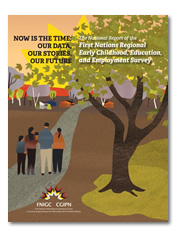
FNIGC - Our Data, Our Stories, Our Future: The National Report of the First Nations Regional Early Childhood, Education and Employment Survey
|
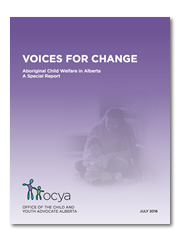
OCYA - Voices for Change: Aboriginal Child Welfare in Alberta a Special Report
|
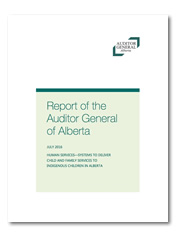
Report of the Auditor General of Alberta - Department of Human Services Systems to Deliver Child and Family Services to Indigenous Children in Alberta
| |
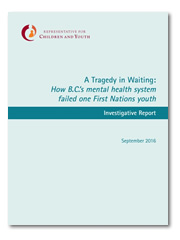
Representative for Child and Youth: A Tragedy in Waiting: How B.C.'s mental health system failed one First Nations youth - Investigative Report
|
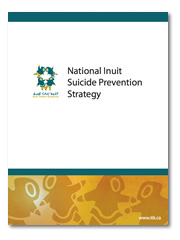
Inuit Tapiriit Kanatami (ITK) - National Inuit Suicide Prevention Strategy
|
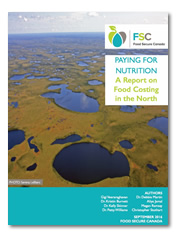
Food Secure Canada (FSC) - Paying for Nutrition: A Report on Food Costing in the North
| |
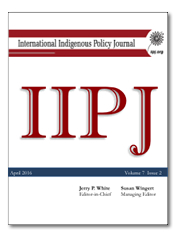
International Indigenous Policy Journal (IIPJ) Vol. 1, Issue 2, 2016
|
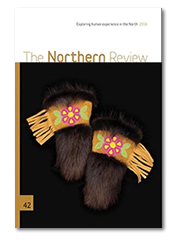
The Northern Review, No. 42, 2016
|
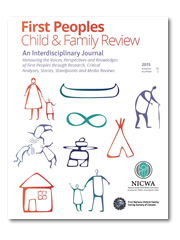
The First Peoples Child & Family Review, Vol 10, No 2 - Special Edition: 10th Anniversary Of The Reconciliation
| |
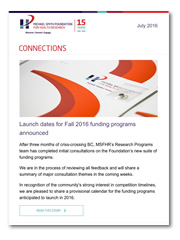
Michael Smith Foundation for Health Research (MSFHR) Connections Newsletter
|
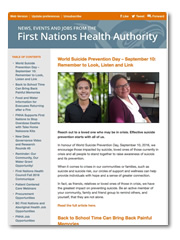
First Nations Health Authority (FNHA) e-Blast Newsletter
|
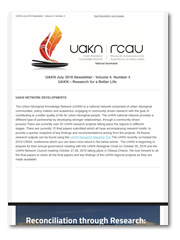
Urban Aboriginal Knowledge Network (UAKN) Newsletter
| |
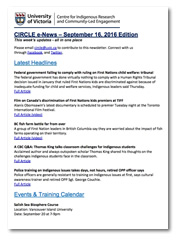
Centre for Indigenous Research and Community-Led Engagement (CIRCLE) Newsletter
|
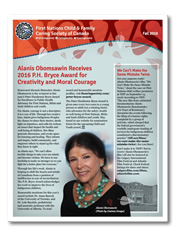
Caring Society Newsletter
|
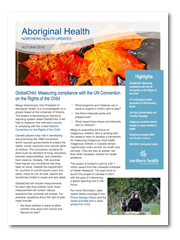
Northern Health: Aboriginal Health Autumn 2016 Newsletter
|
|
|
|
Online Multimedia
| |
This section features infographics, interactives, apps or videos that we found interesting or educational. Please note the links provided in the NCCAH newsletters are for general interest only and do not indicate an endorsement. The views expressed in the linked resources do not necessarily represent the views of the NCCAH or our funder the Public Health Agency of Canada.
Send us an email if you have multimedia resources you would like included in our next newsletter to nccah@unbc.ca with "Multimedia Submission" in the subject line.
| |
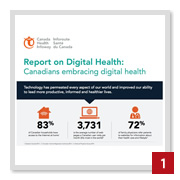
|
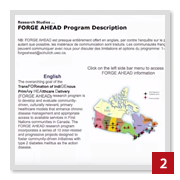
|
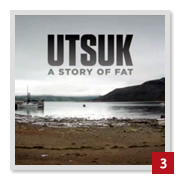
| |
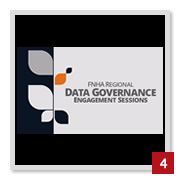
|
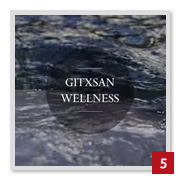
|

| |
1) Canada Health Infoway (CHI) Report on Digital Health: Canadians embracing digital health is an infographic report showing statistics and testimonials about how Canadians are using technology and digital health tools to improve their health and health care.
2) This video describes how Dr. Stewart Harris' focus on population health and primary care has led him to managing one of the country's most promising programs, FORGE Ahead, to tackle the prevalence of diabetes in First Nations.
3) In this documentary video, "UTSUK: A Story Of Fat - A Film About Indigenous Health, Traditional Food and Change in the Arctic", the UTSUK research program, funded through the International Polar Year, ArcticNet and Northern Contaminants research programs in Canada, looks at the relationships between environmental change, marine fats and Inuit health and well-being in the Arctic.
4) The video "Wellness Indicators" is one in a series recorded around the province of BC at different FNHA Regional Data Governance Sessions.
5) Created by the Gitksan Government Commission (GGC) the video "Exploring Gitxsan Wellness - A Digital Story" was inspired by the community photo voice project to develop a Gitksan Wellbeing model.
6) In this podcast of the CBC Sunday Edition guest host Rachel Giese speaks with Dr. Charlotte Loppie, the Director of the Centre for Indigenous Research and Community-Led Engagement (CIRCLE), about the consequences of racism directed towards Indigenous people in Canada. To hear more from Dr. Loppie watch the NCCAH Webinar "Anti-Aboriginal Racism in Canada: A Social Determinant of Health".
|
|
|
The NCCs of NCCPH
| |
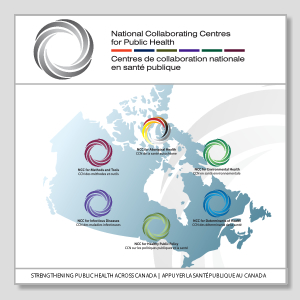
|
The NCCs of NCCPH work together to promote and improve the use of scientific research and other knowledge to strengthen public health practices and policies in Canada. We identify knowledge gaps, foster networks and translate existing knowledge to produce and exchange relevant, accessible, and evidence-informed products with practitioners, policy makers and researchers.
Read the latest NCC e-bulletin
|
|
|